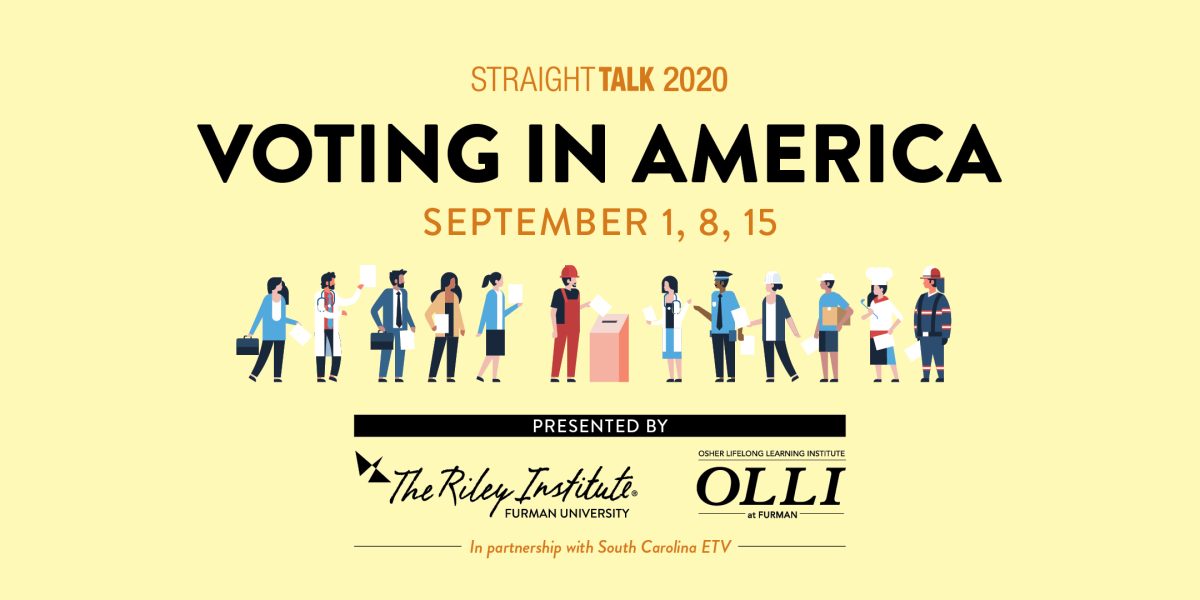Prior to Session 3, the final segment of the StraightTalk series: “Voting in America” The Paladin reached out to David Levine, a panelist that will be featured in the session, to discuss some of the hot topics leading up to November’s election. Levine was able to offer valuable insight, given that he serves as an elections integrity fellow at Alliance for Securing Democracy, The German Marshall Fund of the United States. When asked what Levine considers to be the biggest threat facing American democracy, he indicated two issues: one being foreign interference in our elections and the second being the lack of confidence voters have in the election process. According to Levine, “voters are concerned about bad actors’ interference in elections… can we say everyone has access to voting, and can a large portion of the population have confidence in election results?”
Mail-in voting has been a hot topic recently, but Levine assured that mail-in voting security has been a priority since the Civil War. Many advancements have been made, such as ballot tracking technology and barcodes that prevent counterfeits. Levine said, “the system as a whole is secure, but the question lies in the implementation.” He noted that Covid-19 will certainly increase mail-in voting, so voters should be diligent in ordering their ballots and checking the status of their ballot after it has been mailed. Regarding concerns with mail-in or absentee voting, Levine suggests a solution to this growing concern: “Be able to explain it or walk people through how it works. If a voter can validate their choices that is an important piece. Have a strong chain of custody protocols. Have a process following election day that can validate results. Give voters the opportunity to verify election results themselves.”
Levine also pointed out some problems in the American voting procedure: “Having a decentralized election process can be an asset, but the flipside is that we have jurisdictions with much less resources than others in terms of money, staff, etc. Every single jurisdiction needs the tools and funds and resources needed to secure their elections.” Levine also pointed out the threat of disinformation as people, especially prominent figures in society, talking about elections in a misinformed manner. The spread of misinformation may be used by foreign adversaries who, according to Levine, can take a piece of false information and dissipate it widely. Levine also suggested modifications like data backups for voter registration systems, such as paper poll books, in the event that something electronic goes wrong during an election.
When asked to comment on President Trump’s suggestion to “check the mail-in voting systems,” Levine suggested voters “seek out trusted sources, such as local and state officials, when they have questions about [the] election.” He then added to use those sources to make a voting plan, which includes forming your own opinions and knowing if, where and when you can early vote. “It’s important to remember a lot of places will be offering early voting” Levine said, indicating that getting a head start is not a bad idea. Not only does voting early help the election officials, but it also helps from a public health standpoint.
Regarding potential voter trends in the upcoming election, Levine suggested that it is hard to know for sure, but he is “hopeful that lots of people turn out to vote…and there is reason to believe there will be a large turnout, as there is a lot at stake.”
Given Furman’s recent accolades as a politically active campus, we wanted Levine to speak about the importance of college students being informed and heading to the polls. Levine advises experts may need to “Build trust, meet voters where they are. Walk ‘average’ voters through the process and arm them with the information about what may be threatening their vote.” He pointed out that individuals hold visions for what is wanted in this country, “but you can’t complain if you don’t participate.” It is important for students to stay informed about voting and to seek out trusted sources when they may have questions.
Levine stated that “Civic education prevents the spread of misinformation,” which would help resolve the problem of low political efficacy. Levine went on to add, “within election interference, you need a whole of society approach.” According to Levine, we need media organizations that understand how elections are run and ones that share correct information about voting procedures in a timely manner, as voters need to know where they can find reliable information. He concluded that “Our elections have gotten more secure, but the spread of misinformation threatens efficacy.”
Stay tuned for Straight Talk Session 3 on Sept. 15. Democracy at Risk: Safeguarding Votes, Voters, and Election Integrity will cover topics such as: fraud with mail in voting, vulnerabilities in our election structure, declining trust in democratic institutions, and what the Constitution really says about how we choose our president.




































